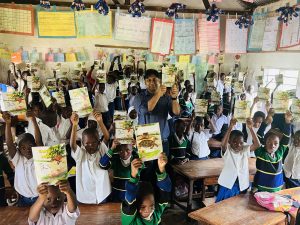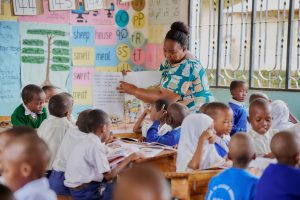I recently had the opportunity to visit several schools in Ifakara, Tanzania, as part of our ongoing education program and I came away deeply inspired.
What left the deepest impression on me was the unwavering dedication of the teachers. Despite facing significant challenges, i.e. limited resources, remote locations, and large class sizes, these educators remain determined in their mission to improve the literacy skills of their students. They are not waiting for ideal conditions or external solutions. Instead, they are actively using locally available, low-cost materials to create effective teaching and learning tools to make meaningful learning possible.
Thanks to the collaborative efforts between CODE and our local partners Children Books Organization for Tanzania, including strong support from the Government of Tanzania, we have been able to support these educators through targeted capacity-building initiatives. Through structured training, mentoring, and the provision of practical teaching learning resources, CODE has worked to empower teachers with effective literacy instruction methods tailored to local needs.
 But what is even more remarkable is how teachers have taken ownership of their development. They are actively applying what they’ve learned, using locally available, low-cost materials to create teaching learning tools, i.e. handmade flashcards, storybooks, and phonics charts. Their innovation and dedication are truly commendable.
But what is even more remarkable is how teachers have taken ownership of their development. They are actively applying what they’ve learned, using locally available, low-cost materials to create teaching learning tools, i.e. handmade flashcards, storybooks, and phonics charts. Their innovation and dedication are truly commendable.
In classroom after classroom, I saw handmade flashcards, storybooks stitched from recycled paper, and phonics charts crafted from cardboard and recycled paper. Their innovation and resourcefulness are nothing short of remarkable. These tools may be simple, but they are powerful and testament to the creativity and commitment of teachers working with what they have.
One of the most encouraging signs of progress was the transformation of classroom environments. Many teachers have embraced the idea of creating a print-rich classroom. The classroom walls are alive with letters, words, student work, and learning aids that surround children with literacy every day. These vibrant, text-filled spaces offer constant exposure to language, making every corner of the classroom a learning opportunity.
 What inspired me even more was seeing students borrowing story books that we had distributed to the schools. Teachers have integrated these books into classroom libraries and are encouraging children to take them home promoting a love for reading beyond school hours.
What inspired me even more was seeing students borrowing story books that we had distributed to the schools. Teachers have integrated these books into classroom libraries and are encouraging children to take them home promoting a love for reading beyond school hours.
The results of these combined efforts are clearly visible. During classroom visits, I observed most students reading with confidence and joy. Their fluency and comprehension have improved significantly. Students were proud to demonstrate their progress and excited to share what they had learned.
The progress I witnessed in Ifakara is a powerful reminder of what can be achieved when passion meets purpose, when local solutions are recognized and nurtured, and when teachers are empowered, supported, and trusted to lead. Even in the most resource-constrained environments, their dedication and creativity can spark a lifelong love of reading and learning.
I left Ifakara with a heart full of hope and a renewed sense of urgency to continue supporting these remarkable educators and their students. The journey toward improved literacy is not easy, but with such inspiring examples, it is certainly possible.
See photos of our book distribution in Ifakara here.


